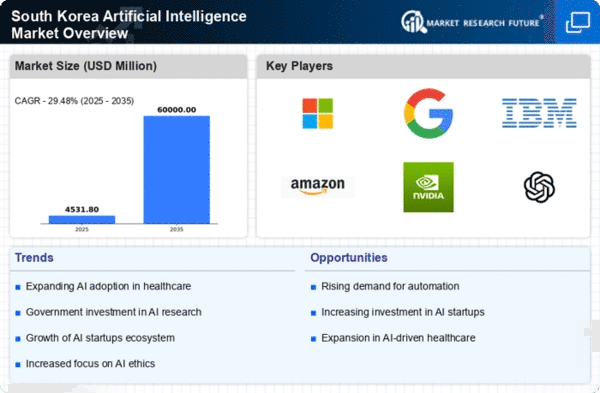Focus on AI Talent Development
The emphasis on developing AI talent is a crucial driver for the artificial intelligence market in South Korea. Educational institutions and private organizations are increasingly offering specialized programs to equip the workforce with the necessary skills in AI and data science. In 2025, it is estimated that over 30,000 graduates will emerge from AI-related programs, addressing the growing demand for skilled professionals in this field. This focus on education is essential for sustaining the growth of the artificial intelligence market, as a skilled workforce is vital for the successful implementation of AI technologies across various sectors. Moreover, collaboration between academia and industry is fostering innovation and ensuring that the talent pool is aligned with market needs.
Increased Demand for Automation
The demand for automation in South Korea is significantly influencing the artificial intelligence market. Businesses are increasingly seeking AI-driven solutions to streamline operations, reduce costs, and enhance productivity. According to recent data, approximately 60% of companies in South Korea are planning to implement AI technologies by 2026. This trend is particularly evident in sectors such as logistics, where AI is utilized for route optimization and inventory management. The push for automation is not only driven by economic factors but also by the need for improved efficiency in a competitive landscape. As organizations recognize the potential of AI to transform their operations, the artificial intelligence market is poised for robust expansion.
Technological Advancements in AI
The rapid evolution of technology plays a pivotal role in shaping the artificial intelligence market. In South Korea, advancements in machine learning, natural language processing, and computer vision are driving innovation across various sectors. The government has invested heavily in research and development, allocating approximately $1.5 billion to AI initiatives in 2025. This funding is expected to enhance the capabilities of AI systems, making them more efficient and effective. As a result, industries such as healthcare, finance, and manufacturing are increasingly integrating AI solutions to optimize operations and improve decision-making processes. The artificial intelligence market is likely to experience substantial growth as these technologies become more accessible and affordable for businesses of all sizes.
Growing Investment in AI Startups
Investment in AI startups is surging in South Korea, contributing to the dynamism of the artificial intelligence market. Venture capital funding for AI-related companies reached approximately $800 million in 2025, reflecting a growing interest from investors in innovative technologies. This influx of capital is fostering a vibrant ecosystem for AI development, enabling startups to explore new applications and solutions. The South Korean government is also supporting this trend by providing grants and incentives for AI research and development. As these startups emerge and scale, they are likely to introduce disruptive technologies that could reshape various industries, further propelling the growth of the artificial intelligence market.
Rising Consumer Acceptance of AI Technologies
Consumer acceptance of AI technologies is steadily increasing in South Korea, significantly impacting the artificial intelligence market. As individuals become more familiar with AI applications in daily life, such as virtual assistants and personalized recommendations, their willingness to adopt these technologies grows. Recent surveys indicate that approximately 70% of South Koreans are open to using AI-driven services, reflecting a shift in perception towards the benefits of AI. This growing acceptance is encouraging businesses to invest in AI solutions to enhance customer experiences and meet evolving consumer expectations. Consequently, the artificial intelligence market is likely to expand as more companies leverage AI to engage with their customers effectively.
















